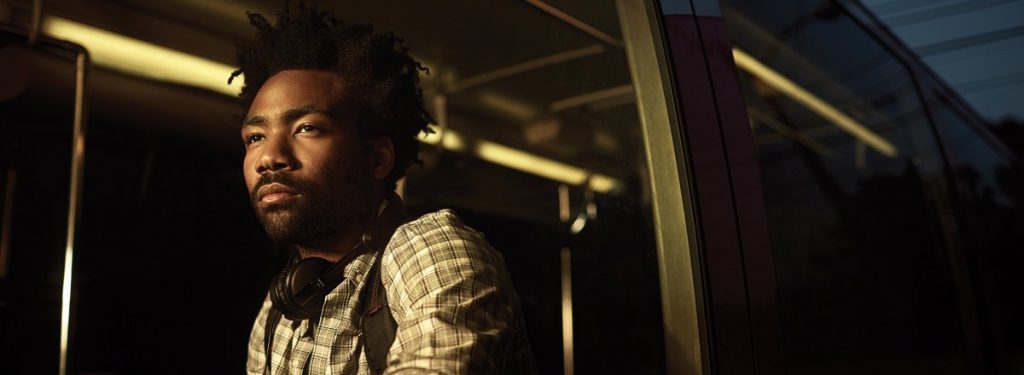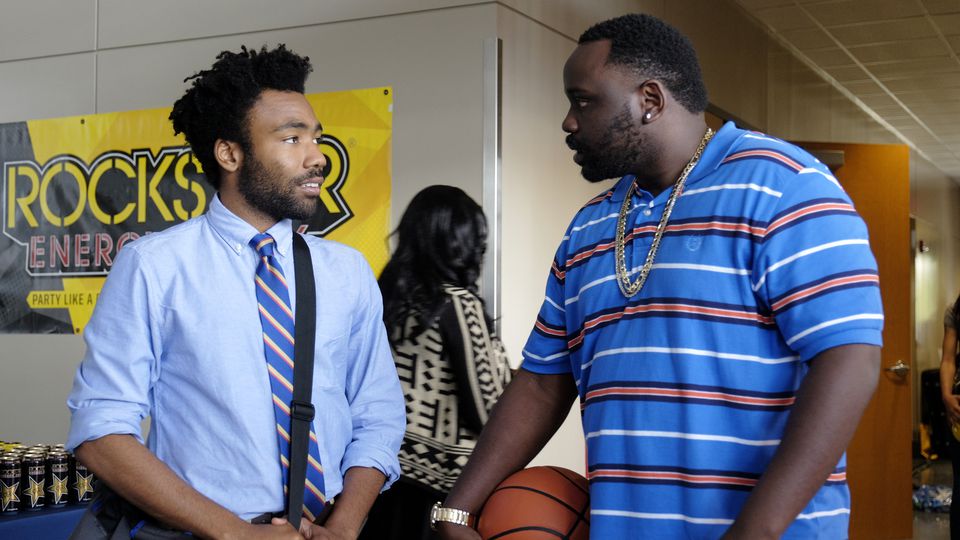Alex writes about Atlanta, contrarianism, and cinematography in comedies.
This is an essay about Atlanta, an essay that is being written because Atlanta is an exceptional television show. With that said, “Atlanta is an exceptional television show” is not what I want you to take away from this essay. There are already enough gears of the Donald Glover promotional machine, and I have no desire to join their ranks. Atlanta’s quality is self-evident. The what matters not to me; I am merely concerned with the how.
The appeal of watching Atlanta lies in the elements of it that are less obvious, because Atlanta is constantly striving to show us a different take on the sitcom. There are characters, and a loose arc of a storyline, but the show is mostly about people simply existing in a world. If I weren’t the type of person who despises people who say things like “Atlanta itself is a character in the show,” I would say, “Atlanta itself is a character in the show.”
What makes Atlanta so consistently watchable – and the thing that makes me feel not quite correct calling it a sitcom – are the show’s constant tonal shifts, often in the course of a single scene. The second episode, Streets on Lock (in the parlance of Friends, “The One Where They Go To Jail”), is a great example of this for reasons that have been made explicit elsewhere. In short, it goes from a sitcom to a comment on mental health back to a sitcom before making you wonder exactly how much an infant brain really registers. There is no adherence to What We Should Do, and the B.A.N. episode is the perfect example, because that is an episode that looks (almost) nothing like any other, and one that entirely eschews the style of the other nine episodes. (It’s the Louie-est thing anybody not named Louis CK has made on popular American television.) Atlanta gives you enough pure entertainment – this show is incredibly funny – that its odder swings are accepted when they fail, and appropriately congratulated when they hit.
To become a comedy that seems unlike other comedies, it seems as though Atlanta has built itself on the backs of dramas, dramas that are known for their particular visual stylings. For most of its scenes, Atlanta looks like the product of a Mr. Robot superfan who just finished binge watching The Knick. Negative space and shallow focus are employed constantly, and the drone shots over Atlanta can’t help but remind one of True Detective season two. (There’s also that scene in the pilot where Earn is staring at the ceiling, talking about his dreams, which echoes Vince Vaughn’s rat monologue.) Atlanta is a show that, stylistically, looks like shows we have seen before, but not comedies, because it often seems like comedy is supposed to be shot in the most boring way possible.
This is the way you’re supposed to shoot comedy: stage it all in a boringly constructed wide shot. Put a camera in front of two chairs, and have Paul Rudd and Seth Rogen crack jokes to each other from the comfort of those properly centred chairs. The idea is that, this way, when these actors play off each other, you can see each element of the laugh, never missing anything. The joke is the focus, not the machinations of filmmaking. This is an idea I generally agree with, but that the shots are so god damn boring has been annoying me for as long as I’ve been smart enough to understand it’s possible to do better. Only recently have directors seemed to start putting more thought into their comedic compositions; last year’s underrated The Night Before is shot in gorgeous anamorphic widescreen that bolsters the comedy while giving the (admittedly light) dramatic elements more weight. Consistent offender Judd Apatow even recently changed his boring compositions as well; Trainwreck was shot on 35mm that kept its jokes in wide shots, albeit wide shots that were actually well composed. Comedy films should look like film, not sitcoms, and this general lack of style in comedies can be easily seen in the unfathomably boring compositions throughout Paul Feig’s movies.
On television, Aziz Ansari and company took to shooting Master of None in anamorphic widescreen, utilizing long takes whenever they could. Some of these stylistic choices hindered the show in other ways – complaints about the performances are not unfounded – but at least it was trying something new. Master of None is a show about newness, shot in an old fashioned style that looks new only because nobody tries to attempt otherwise anymore. Atlanta takes this newfound focus on comedy cinematography and runs wild with it.
The club episode is the best example, a visual spectacle that uses its visuals to bolster some of its funnier jokes. When the promoter is leading Earn to the back room to collect his (and Alfred’s) money, the strobe lights on the dance floor make it hard for Earn to keep his eye on his target; the whole thing looks like an action movie, but ends up as a joke about anybody who has ever tried to find somebody on a dance floor. Later, the promoter evades Earn yet again, seemingly floating backwards away him in a wide shot that doesn’t immediately make it clear where we should be looking; in this case, the laugh is bigger because we have to find the joke in the frame. And finally, as the promoter makes his final escape through a secret door, he remains out of focus in the background as Earn sips his Laphroaig. The face the promoter is making is truly funny, and yet it isn’t even the focus of the shot, again making it funnier. The perspective we’re following is Earn’s, so it only makes sense that we can’t quite find the promoter in frame; he remains ever so slightly soft in our focus.
On a more abstract level, there are plenty of moments in Atlanta that straight up don’t make sense in the reality we exist within. I am aware that invisible car is not a real thing, just like I know Justin Bieber is white. But what these absurdist moments do are allow the viewer to ask themselves questions they wouldn’t have been concerned with twenty-two minutes previous. After watching the Bieber episode with James, we talked about why the show made Biebs black. I posited the idea that it was to make the character just different enough from the real Bieber to keep FX’s lawyers off the show’s back, which didn’t seem to be the case. After some time, I realized the reason was as simple as the question “What if Justin Bieber were black? How much of this shit would we have let him get away with?” (According to writer Stephen Glover, that seems to be the idea.) Behind these odder leanings are actual thoughts, thoughts that sometimes take some parsing to get to the bottom of. While some episodes are relatively easy to sort out immediately – the Van episode is a simple tale of somebody re-entering a world they left behind long ago, and the repercussions that come with it – time makes the best moments of Atlanta even better simply because the show refuses to give immediate answers.
There is nothing less appealing than doing something the way it has already been done. When popular opinion swings one way, my natural inclination is to assume the opposite is more logical. Obviously, this is not a hard and fast rule, but in day-to-day life, what I desire the least is what a lot of people already have. When somebody mentions to me that what I’m doing is uncommon, I only assume that I’m even more correct than I already believed.
And herein lies the inherent contradiction of my focus on Atlanta here: I am writing a thinkpiece about contrarianism, ostensibly through the lens of discussing a show that has already inspired countless thinkpieces. I am doing what everybody else has already done. Whether positive or negative, interesting or uninteresting, it’s all noise. I am not interesting, I am merely static.
This further proves how good Atlanta is, though. The show is doing things that have been done before, but it is doing them differently. As I add to an intimidating mound of unread tabs of thinkpiecey nonsense, Atlanta adds to the so-called Peak TV pile. At least it adds something that combines good elements of those that came before it, and the different perspective that filters those elements puts it at the top of an oversized pile. Atlanta is the manifestation of its own excellent, Pharcyde-style promos: their world moves in one direction, but Atlanta moves the opposite way.
At the end of a dinner date gone awry, Earn drives Van home as she slams a door in his face after an ill-timed anti-salon remark. In response, Earn stands outside the closed door, delivering the following monologue:
“I know I have a daughter. And I know she deserves the best. I don’t think I have to compromise what I want out of life to do that, especially if I think it’s going to provide for her. You know me, Van… I can do this. I’ve just gotta do it my way. And if you can’t do this out of love for me, do this out of love for her.”
It’s something that – even though this is only the third episode – feels decidedly un-Atlanta. This is a speech you would hear on a normal television show, not a proudly abnormal one. It is a speech that would lead Van to open the door, to hug Earn and congratulate him for allowing himself to be honest and emotional. And while Van does open the door, what she says returns the show to the tone Atlanta embodies:
“That’s some dumb shit. That’s some dumb ass shit, Earn.”
When everybody goes one way, go another. It’s the only way.






